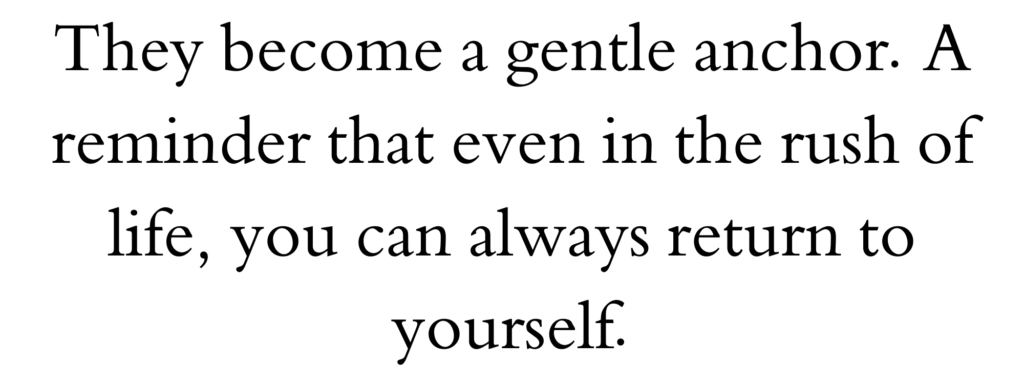We often think personal growth requires big, dramatic changes—a new career, a bold resolution, or a major breakthrough. But sometimes, it’s the smallest daily practices that create the deepest shifts. Reflection, in particular, doesn’t have to be overwhelming or time-consuming. In fact, just five minutes a day of intentional journaling can reshape the way you see yourself, your choices, and your life.

This isn’t about writing pages of thoughts or keeping a detailed diary. It’s about creating a simple, sustainable ritual that gives you clarity, calm, and direction—without taking more time than a quick scroll on your phone.
Let’s explore why a 5-minute journal is so powerful, how to do it, and how it can slowly but surely change the way you live.
Why 5 Minutes is Enough
Many people avoid journaling because they imagine it requires long hours of writing. The truth is, even five focused minutes can be transformative if you know what to reflect on. It’s not about how much you write, but what you write.

Five minutes is long enough to:
- Ground yourself before the day rushes in.
- Pause and digest what really happened during the day.
- Capture insights before they fade into the background noise.
Reflection is like cleaning a window. It doesn’t matter if you polish for five minutes or fifty—what matters is clearing away the fog so you can see clearly again.
The Science of Short Reflection
Psychologists have found that reflection strengthens self-awareness, which improves decision-making, emotional regulation, and overall well-being. Journaling also has proven benefits: reduced stress, better focus, and a stronger sense of gratitude.
What’s interesting is that these benefits don’t require pages of writing. Short, focused reflections can be just as powerful as long ones because they cut straight to the heart of what matters.
Think of it as mental alignment: a small but consistent adjustment that keeps your life moving in the right direction.
The Structure of a 5-Minute Journal
To make those five minutes truly count, structure helps. You don’t have to stare at a blank page—you just need a few prompts to guide your thoughts. Here’s a simple framework you can use every day:
Morning (2–3 minutes):
- What am I grateful for today?
- What would make today meaningful?
- What kind of person do I want to be as I go through this day?

Evening (2–3 minutes):
- What went well today?
- What lesson did I learn?
- What am I letting go of before tomorrow?

That’s it—just three questions in the morning, three in the evening.
This structure takes you through a full circle: beginning your day with intention and gratitude, and ending it with reflection and release. Over time, these small check-ins form a quiet but powerful rhythm that grounds you.
Why These Prompts Work
Each question has a deeper purpose:
- Gratitude trains your mind to focus on abundance rather than lack. It gently rewires your thoughts to notice the good instead of defaulting to stress or complaints.
- What would make today meaningful ensures you don’t lose your day to autopilot. It nudges you to prioritize what actually matters.
- Who do I want to be shifts your reflection from tasks to character. It helps you focus not only on what you do but also on how you do it.
- What went well today cultivates self-recognition. You celebrate progress, even in small forms, instead of only seeing flaws.
- What lesson did I learn transforms mistakes or struggles into growth opportunities.
- What am I letting go of gives you peace before bed, reminding you that not everything needs to be carried forward.
These simple prompts touch the essential parts of human experience: gratitude, purpose, identity, growth, and release. Together, they create balance.
How It Changes You Over Time
At first, it might feel like nothing is happening. You’ll write short, simple answers: “Grateful for my coffee. What matters today: finishing work. I want to be patient.”
But something subtle begins to shift. After a few weeks:
- You’ll notice patterns—what consistently matters, what drains you, what brings you joy.
- Your inner dialogue softens. Instead of being harsh on yourself, you’ll start seeing your efforts and progress.
- You’ll feel lighter. By releasing what no longer serves you each night, you stop carrying yesterday’s weight into today.
- You’ll become more intentional. Instead of drifting, you’ll live with a clearer sense of direction.

And then one day, you’ll look back and realize the person writing in that journal is not quite the same as the person who started. More aware. More grounded. More aligned.
Making It Stick
The key to success is consistency, not perfection. You don’t need to write long paragraphs. Some days, your journal might only have a few words. That’s fine. What matters is showing up.
Here are a few tips to make it a lasting habit:
- Keep it simple. Use a small notebook or even your phone’s notes app. The less complicated, the better.
- Tie it to an existing habit. Journal right after brushing your teeth, drinking your morning coffee, or turning off the light at night.
- Don’t aim for perfect answers. Journaling is about honesty, not performance.
- Be kind to yourself. If you miss a day, just continue the next. Reflection works best when it’s gentle, not pressured.

The Beauty of Five Minutes

We often underestimate how much can change in a small window of time. Five minutes doesn’t seem like much. But five minutes a day becomes over thirty hours a year spent in reflection. Thirty hours of getting to know yourself better. Thirty hours of clarity, gratitude, and direction that would have otherwise slipped away.
When you look at it that way, the return is extraordinary.
Final Thoughts
Life doesn’t always need sweeping changes to move forward. Sometimes, all it takes is a pause—a few moments to sit with yourself, to notice, to realign. A 5-minute journal is exactly that.
It’s not just about writing. It’s about listening—to your thoughts, your emotions, your priorities. It’s about slowing down enough to ask, What truly matters right now?
Over time, those five quiet minutes become more than a habit.

And maybe, just maybe, those five minutes each day will change everything.





